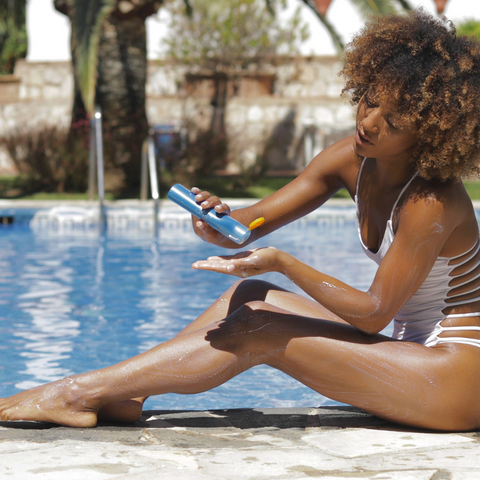Free Shipping Australia-Wide on Orders Over $120 ✨
The importance of SPF use daily.

Using a broad spectrum SPF product every day is essential to decrease the risk of skin cancers and precancers and prevent premature aging caused by the sun.
This article will take a deeper look at what SPF is used for and what different types of sunblock are designed to do. We will also discuss how you can easily incorporate SPF into your existing skincare routine.
The Importance of Using an SPF Product Every Day
People use sunscreen to protect themselves from the sun, but it is essential to understand how the sun’s rays can harm your skin and overall health.
There are two types of rays that SPF products protect you from.
Ultraviolet A (UVA) has longer wavelengths (usually 315 nm to 400 nm), and they can penetrate through to the middle layer of your skin and cause minor damage. This is how you tan, but the damage can also contribute to premature aging. UVA can also trigger DNA damage that leads to skin cancer.
Ultraviolet B (UVB) has shorter wavelengths (around 280 nm to 315 nm). These shorter waves lead to damage in the DNA of the outer layer of skin, causing sunburn.

Different Types of Sun Protecting Agents
Depending on which ingredients are used, the sun’s harmful rays can be dealt with differently. The most important ingredient to consider is the active ingredient. This makes up anywhere from 10 to 30 per cent of the product, and it defines how harmful rays are dealt with.
While there are 16 active ingredients approved by the FDA, the ones most commonly used include:
Avobenzone
Homosalate
Octinoxate
Octisalate
Octocrylene
Oxybenzone
Titanium dioxide
Zinc oxide
These ingredients do the heavy work of protecting your skin from harmful sunlight. For improved protection, some products contain a combination of active ingredients.
Chemical Sunscreens
Chemical sunscreens use ingredients that absorb harmful rays, such as:
Avobenzone
Benzophenone
Octinoxate
These sunscreens create a thin film that soaks up the harmful rays, converts them into heat, and releases them. Some chemical sunscreens are effective against UVA and UVB, but most work only for UVB absorption.
Physical Sunblocks
A physical sunblock provides more protection because it is effective against both UVA and UVB rays. In addition, sunblocks contain active ingredients like titanium dioxide or zinc oxide that reflect radiation back into the atmosphere.
These minerals scatter the rays instead of allowing them to come in contact with your skin, and they provide your skin with complete protection.

Incorporating SPF With Your Skincare Routine
If you do not already use SPF, then now is the time to start. The good news is that adding SPF to your routine is easy, and you do not need to change up what you already do.
Choose a lightweight, broad-spectrum SPF to add on at the end of your skincare routine. Higher SPFs are preferred, but most dermatologists recommend an SPF of at least 30. This will block 97 per cent of the sun’s UVB rays.
You should add sunscreen at the end of your skincare routine, usually after your moisturizer soaks in. This limits any changes in the properties that might dilute the product.
Remember to reapply every two hours or as you sweat or swim it off. You should apply an SPF product every day, even if it is cloudy or you intend to stay inside. The sun’s rays can easily pierce through clouds and windows, so consistent protection is the best approach.




